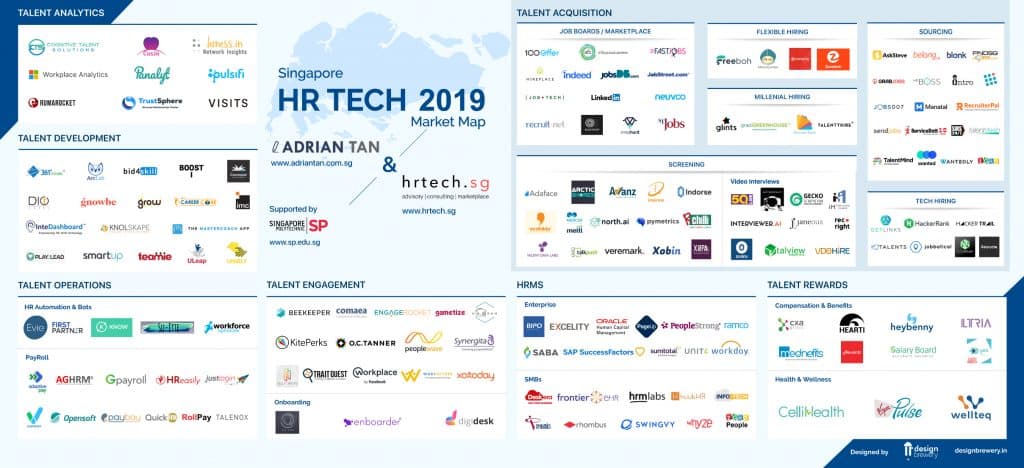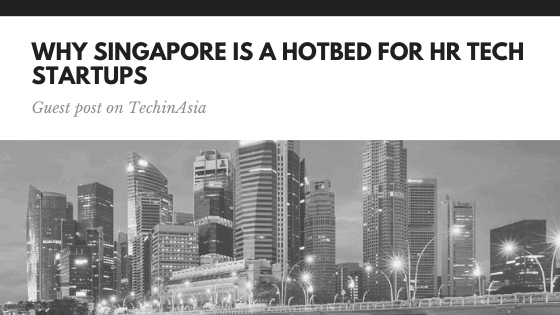[guestpost]This article is originally published on TechinAsia.[/guestpost]
From the traditional record management system to the AI screening chatbot, human resources tech has progressed by leaps and bounds, growing to become a US$400 billion industry worldwide.
Even the Singapore government is involved in the space. In May, the country’s Minister of State for Manpower, Zaqy Mohamed, announced the formation of the HR Industry Transformation Advisory Panel (HRTAP).
Composed of HR and business leaders, representatives from the industry, and tripartite partners, the entity will build on the government’s HR plan, formulate strategies, and lead efforts to further develop the sector in Singapore.
Singapore’s HR tech ecosystem
With close to 200 HR tech vendors in the country, it says a lot about the market demand for such firms.

Players like DBS Bank have deployed Jim, a virtual recruiter that helps the company hire wealth planning managers more efficiently.
There are also several local and emerging startups in play, such as HReasily, Swingvy, and StaffAny.
But having said that, Singapore is still a small country vis-a-vis its neighbours. According to its statistics department, 99% of companies in the country are small and medium-sized enterprises.
Given that most HR tech firms operate on a software-as-a-service model, the number of employees that their clients have mattered.
This means that vendors must acquire more customers in order to achieve an economy of scale.
The perspective from HR tech firms
Regardless of the constraints, the high number of HR tech startups in Singapore is real, and from my discussions with a few vendors, I can understand why.
Ease of doing business
Registering for a business is relatively easy in Singapore – founders can typically do this in a matter of hours.
Sei Wee, CEO of tech recruitment platform IoTalents, sees this speediness as a key advantage. “This allows HR tech vendors to focus more on their product and business development and less on administration,” he shares.
On top of that, government support has come fast for HR tech startups. Qian Li, a sales consultant for business solutions firm Straits Interactive, agrees with this sentiment.
“The level of support [from] the Singapore government, primarily captured in the Smart Nation initiative and delivered via various government agencies in the form of grants, made adoption of HR tech much more palatable and lighter on the pocket,” he says.
But it’s not just the government that supports such vendors.
Singapore-based associations and communities have sprouted up to educate the market about HR tech as well. The Human Capital Leadership Institute, the Singapore Human Resources Institute, and the Institute for Human Resources Professionals are just some examples of this.
And the movements in the space have not gone unnoticed by venture capitalists either, given how the amount of investment poured into Singaporean HR firms has skyrocketed.
In 2019 alone, there have been several funding announcements for local startups in the industry.
In April, Swingvy raised US$7 million in its series A round, while workforce management platform StaffAny bagged US$722,000 in seed funding in August.
HReasily also banked US$5 million in September for its series A round, valuing the company at over US$100 million.
A central hub
Good government support and business legislation aren’t Singapore’s only advantages for HR tech startups. Culture, infrastructure, and its central location within Southeast Asia also play a part.
Tushar Tejuja, managing director of cloud-based tech recruitment firm HackerTrail, thinks the country’s small landmass is actually a plus. “It’s possible to meet five clients in a day without breaking a sweat,” he shares.
This is important for business-to-business firms like HR tech providers that benefit from face-to-face client meetings.
Another factor that works to Singapore’s advantage is that it’s home to many regional headquarters.
According to Chelsea Sim, CEO and co-founder of Singapore-based chatbot firm Botbot.ai, this also means decision-makers are located in the city-state.
As HR tech solutions often involve updating company processes across different departments, this makes approval and adoption easier, and “helps to drive things forward much faster,” says Sim.
But it’s the forward-thinking culture of organizations in Singapore that Jay Huang, co-founder and CEO of HR predictive analytics firm Pulsifi, really appreciates.
“Companies [in Singapore] tend to appreciate quality improvements that HR tech can bring about,” he observes.
The perceived importance of transforming the country’s HR processes is reflected in the creation of HRTAP, which also aims to support HR professionals in their digital transformation journeys.
The city-state’s dedication to the sector has not gone unnoticed by firms in other countries as well.
Pankaj Bansal, co-founder and CEO of HR SaaS PeopleStrong, explains why he chose the city-state as the company’s first office outside of India.
“Singapore is not just a hub and gateway to Asia. The country is also very much focused on the new code of work and welcomes the new technology for the workforce.”




